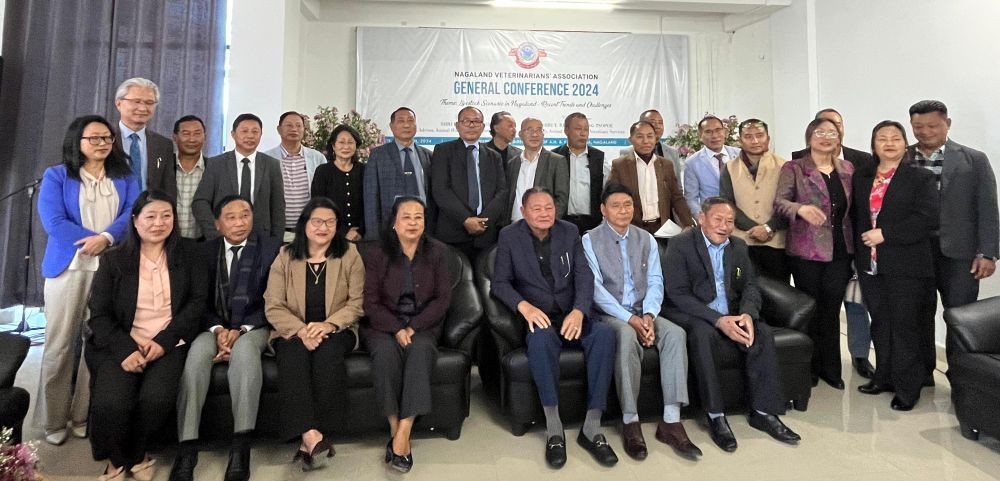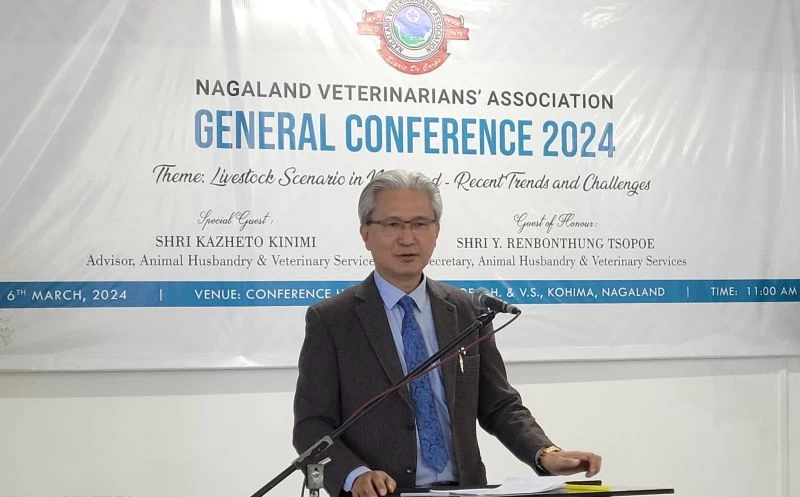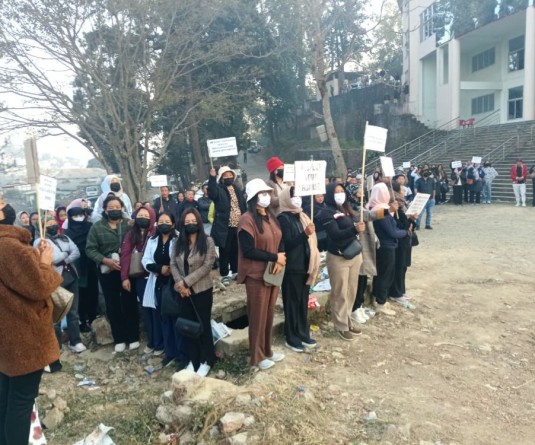
Nagaland Veterinarians’ Association General Conference held
Morung Express News
Kohima | March 6
Advisor for Animal Husbandry & Veterinary Services (AH&VS), Kazheto Kinimi on Wednesday impressed on the need to make veterinary health care services the most efficient and transform livestock farming into a thriving, profitable business.
He was speaking as the special guest of the Nagaland Veterinarians’ Association General Conference held on the theme ‘Livestock scenario in Nagaland -recent trends and challenges’ at the conference hall of the Directorate of Animal Husbandry & Veterinary Services, Kohima.
Reflecting on the department’s journey which had a modest beginning with 27 veterinary doctors in 1961, Kinimi said it now has a team of 165 doctors, 13 hospitals, 55 veterinary dispensaries, 10 veterinary health centres, 14 DDLs, 33 farms and many institutes.

Coming to the present with new challenges, such as shortage of production, unemployment, high production costs, and the impact of emerging diseases like African swine fever and Lumpy skin disease, Kinimi urged the veterinarians to rise above the obstacles and utilize the technical expertise to address the needs of the people.
He also challenged the veterinarian to evaluate its progress and accelerate efforts by adopting a mission mode approach and exploring public-private partnerships to achieve its goals.
The Advisor also wanted that the department hospitals and dispensaries compete with private clinics in terms of services and delivery systems, and its poultry, piggery, and dairy farms with private farms in terms of production and revenue so that the department can identify its shortcomings and take corrective measures accordingly.
Meanwhile, he congratulated the department for successfully registering Thenyi-vo, Sumi-ne goat, and Nagal pig as indigenous breeds. This achievement, he maintained is a testament of the dedication and support provided by NBGAR. He said the department must continue to promote and preserve Naga indigenous animals for the benefit of the state.
Kinimi also claimed that the present government was committed to enhance the capacity and strengthening the veterinary health services in the state. Aligning with this vision, he informed that the government has agreed to construct three new veterinary hospitals in the newly created districts while modern equipment such as X-ray machines, ultrasound devices, and pregnancy diagnostic kits will be added to select hospitals by 2024-25.
The government also plan to provide efficient veterinary services, elite progenies to farmers, and smart skilling and consultancy services to the people with a vision where the production of meat, milk, and eggs is efficiently and commercially driven by ‘our’ farmers and entrepreneurs.
Livestock trends and challenges
Discussing on the theme, Dr BM Sunep, Joint Director of AH&VS, discussed the recent trends, challenges, and the need to achieve self-sufficiency in this sector.
He emphasised on the importance of understanding the factors and dynamics that work for or against ‘us’ in order to succeed and highlighted that establishment in livestock farming, is crucial for economic self-sustainability and food security adding that livestock farming acts as a stepping stone for other developmental activities.
Citing the current trends and challenges, Dr Sunep mentioned favourable factors, such as increasing demand for quality meat, milk, and eggs, as well as the potential for exporting organic livestock products, and threats posed by emerging diseases like African Swine Flu, lumpy skin disease, foot-and-mouth disease etc .
To address all these issues, he stressed the need for bio-security measures and the implementation of the Nagaland Livestock Farm and Disease Control Act to protect the livestock farmers.
Dr Sunep also mentioned that challenges such as non-availability of quality feed and fodder, which leads to high expenses in livestock farming, and shortage of technical manpower, including veterinarians and para-vets, and called for the availability of animal health service providers in every village.
While highlighting in brief the negative consequences of ecological changes, Dr Sunep viewed that livestock farming cannot be sustainable if soil fertility continues to decline. To this end, he stressed on the need to put more efforts to recreate a natural environment by engaging in programmes, projects, and plans in collaboration with the Agriculture and allied departments.
Others who spoke includes Secretary, AH&VS, Y Renbonthung Tsopoe; Director, Dr Achila Ao; President, Nagaland State Veterinary Council, Dr Simon Ao and presidential address by Dr. KN Zubem oHumtsoe.






